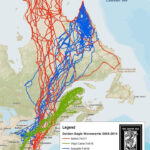-
Lake Ontario, one of the five Great Lakes of North America, was an important site of exploration and discovery for both Native American peoples and European settlers. Here’s a brief historical account of the exploration of Lake Ontario:
For thousands of years, the lands surrounding Lake Ontario were home to a variety of Native American nations, including the Haudenosaunee (Iroquois) Confederacy and the Huron-Wendat. These peoples lived off the abundant resources of the lake and its tributaries, fishing, hunting, and farming in a sustainable way that had allowed them to thrive for generations.
The first European to explore Lake Ontario was the French explorer Étienne Brûlé, who reached the lake in 1615 as part of a larger mission to map the northern reaches of the continent. Brûlé was followed by other French explorers, traders, and missionaries, who established a series of trading posts and missions along the shores of the lake.
In the late 1600s and early 1700s, the British established a series of forts in the region, including Fort Oswego, Fort Niagara, and Fort Frontenac, as part of their efforts to control the fur trade and the waterways connecting the Great Lakes to the Atlantic Ocean. These forts were contested by the French, who saw the region as vital to their own colonial interests, leading to a series of military conflicts, including the Seven Years’ War.
After the British victory in the Seven Years’ War, the lands surrounding Lake Ontario became part of the British Empire, and the lake itself became a key transportation and communication route, connecting the interior of the continent to the Atlantic coast. The lake saw increased trade and settlement, as well as the development of a thriving shipping industry, as goods and people traveled back and forth across its waters.
In the late 1700s and early 1800s, the new United States established its own presence on the lake, building fortifications and ports to defend its borders and control trade. The War of 1812 saw battles fought on the lake and its shores, as both the British and the Americans struggled to control this important strategic area.
In the years that followed, Lake Ontario continued to play an important role in the development of the region and the nation, serving as a hub of trade, transportation, and communication, and helping to shape the history and identity of the people who lived along its shores.
Credentials
HW
Skills
Digital Consultant
10%
Pals
LadyJP
@ladyjp
Donnie T
@donnie-t
Weirdly Interesting
@weirdly-interesting
Walter Cranckcase
@walter-cranckcase
Jackie Rogers Jr
@jackie-rogers-jr












